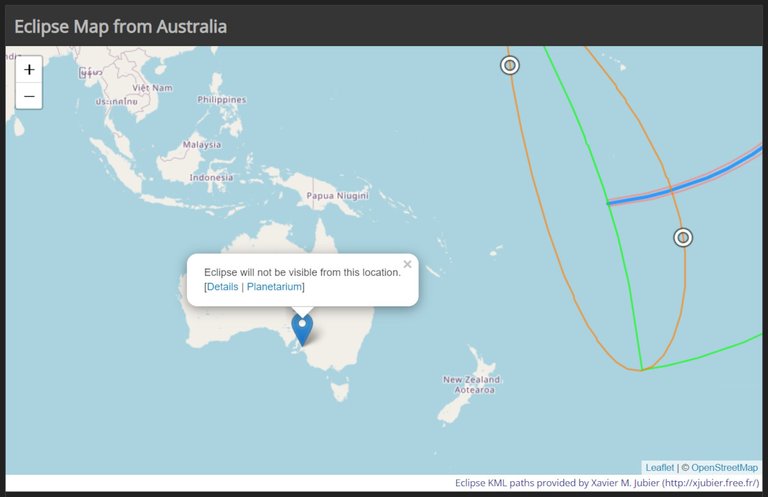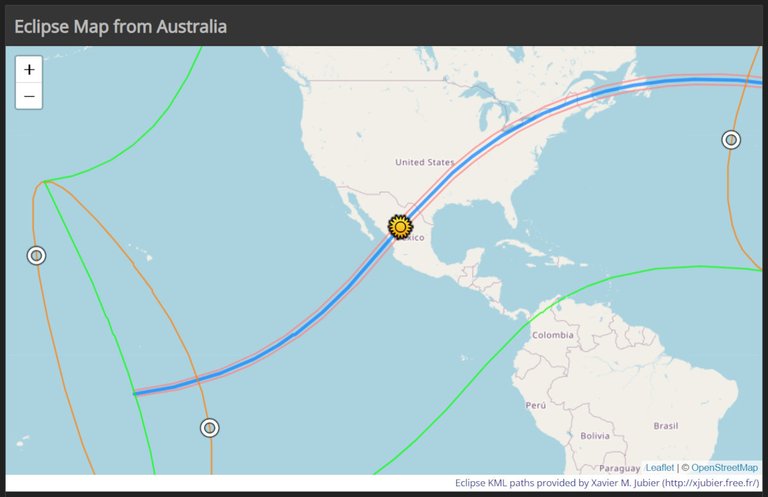Eclipse — April 8th 2024

I got quite excited scrolling Live Science the other day when I saw an article about an upcoming solar eclipse just over a month away in April.

But, as I found out a short time later while looking at The Sky Live website, it won't be visible at all from where I live. A little disappointing, but oh well!
Reading the Map
You can see in the second image the visibility of the eclipse displayed as a margin. Totality is marked between the narrow orange lines in the centre: with the blue line running through. From these vantage points, the eclipse will last from 3 to 4 minutes depending on location, and a complete shading of the sun by the moon can be seen ("eclipse totality").
The Best Viewing
These places include parts of the Mexican states of Sinaloa, Nayarit, Durango and Coahuila and parts of the US states of Texas, Oklahoma, Arkansas, Missouri, Kentucky, Illinois, Indiana, Ohio, Pennsylvania, New York, Vermont, New Hampshire and Maine. Some of South East Canada will also be good for viewing with totality visible from parts of Ontario, Québec, New Brunswick and the Island of Newfoundland. Regions surrounding these will also have excellent viewing, though the eclipse as viewed will be partial, becoming more partial the further away you get from that central blue line. However, as the maps shows, everywhere within the broader green lines — pretty much the entirety of continental North America — will view this eclipse in some form. Lucky! 😄
Have a look at the map for yourself and let me know if you're going to see the April 8th Eclipse.
Look After Your Eyes
Here's the part where I write a few words about not hurting your eyes. I can only do so much as they're your eyes and so your responsibility. If you plan to gaze upon this upcoming total eclipse and wish to protect your visual connection to this beautiful world, you need to know what you're doing. For that, I defer completely to the US National Parks Service webpage precisely on this topic: How To View A Solar Eclipse Safely
Apparently, according to that page, the only time it's safe to view an eclipse directly is when it's a total eclipse and only during that brief (3 to 4 minute) period of totality; when the majority of the sun's light is blocked by the moon. This only applies for those viewing locations where totality will be visible, so make to check the map! And if you're going to do some eclipse-watching, read the damn safety page...
A Long Wait
The next total solar eclipse visible from Australia won't be happening until 22 June 2028 so pay some mind to how astronomically fortunate you are this year if you live in the US, Canada or Mexico!
Hopefully there's a few Hivers out there with the equipment to capture some footage or photography of this upcoming eclipse. I suppose we'll see!
-Sing
Both images courtesy of theskylive.com
I had thought about travelling East, to see the eclipse, but it now seems unlikely I will. That doesn't mean it will be a lost event, there will be lots of pictures, and maybe its not the best idea to put myself in the path of a shadow that historically foretold doom and drove men mad. I often wonder about the moon, and the eclipses, and I am sure there have been countless men for ages who looked up at the moon, and saw it eclipsing. And whatever they thought about it, they now carried that knowledge, and passed it on to others. That he moon sometimes goes red, or disappears. Fascinating stuff, truly. I used to think Space was all about the future but then I began studying history and I realized... its all so old. We are just looking at the stars in the sky, when we look at the ideas from the past. Most of it is in darkness, lost. And what small glimpses we can observe, is a faint light of whatever truth is behind it. I hope you are able to enjoy the experience, and I look forward to more posts about it! !PIZZA
There must be at least one good book out there about specific solar eclipses in history, and people's reactions to them. I had a bit of a search of Wikipedia and found one article about Historically significant lunar eclipses. No corresponding article for solar eclipses though, which is kind of odd. Oh well.
Something interesting about the stars, you might already know, but we see them as they were in the past. This aligns with what you say about it all being so old. If a star is 10 lightyears away from Earth, for example, we're seeing the light as it shone 10 years ago when we stargaze. Literally we are looking in to the past. 10 lightyears is pretty near compared to the average for stars, as well.
Thanks for stopping by, really appreciate it!
$PIZZA slices delivered:
@darkflame(2/15) tipped @singularity.zero